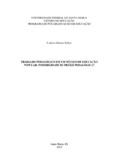| dc.creator | Schio, Leticia Genro | |
| dc.date.accessioned | 2020-02-07T15:33:35Z | |
| dc.date.available | 2020-02-07T15:33:35Z | |
| dc.date.issued | 2019-08-05 | |
| dc.identifier.uri | http://repositorio.ufsm.br/handle/1/19521 | |
| dc.description.abstract | This work investigated how the theory of the permanent revolution underlies, theoretically and
politically, the pedagogical work developed by the educators of the "13 de Maio Núcleo de
Educação Popular", especially what is done in the course "How Society Works I". To this end,
it was a bibliographic research, and a study of didatic materials produced by the educators of
the referred popular education entity and a questionnaire answered by an educator was carried
out. Studies were conducted about the historicity of the theory of permanent revolution
elaborated by Marx and Engels in 1850; about the historical constitution of the 13 de Maio NEP
in relation to the intrinsic relationship of the class struggle movement in Brazil during the
Business-Military Dictatorship (1964 - 1985), in the period of redemocratization of the country,
until the present day;the study of productions about pedagogical work (especially those
produced by Kairós - Research and Studies Group on Work, Education and Public Policy); and
also, the study of the script of the course “How Society Works I” in the light of the elements of
the theory of permanent revolution and how these elements are expressed in the pedagogical
work done by the educators in the course. The choice for this specific course was understood
because it expresses, in a synthetic form, elements that in the set of courses held by 13 de Maio
are seen in more depth and also because this is the course most widely known by set of the
Brazilian working class. The understanding that the pedagogical work carried out in the context
of theoretical-political formation assumes specific characteristics that differ from the
particularities of that performed in formal school institutions, it led the investigation about these
characteristics. The considerations reached express that this is a pedagogical work intrinsically
linked to the interests of the working class, this is a pedagogical work based on the rigorous
knowledge about what is the capital and how this social relationship of control and exploitation
of work is established and is reproduced from its innumerable constituent and contradictory
mediations. | eng |
| dc.language | por | por |
| dc.publisher | Universidade Federal de Santa Maria | por |
| dc.rights | Attribution-NonCommercial-NoDerivatives 4.0 International | * |
| dc.rights.uri | http://creativecommons.org/licenses/by-nc-nd/4.0/ | * |
| dc.subject | Trabalho pedagógico | por |
| dc.subject | Teoria da revolução permanente | por |
| dc.subject | 13 de Maio Núcleo de Educação Popular | por |
| dc.subject | Pedagogical work | eng |
| dc.subject | Permanent revolution theory | eng |
| dc.subject | 13 de Maio Núcleo de Educação Popular | eng |
| dc.title | Trabalho pedagógico em um Núcleo de Educação Popular: possibilidade de Práxis Pedagógica? | por |
| dc.title.alternative | Pedagogical work in a Center of Popular Education: is there possibility of Pedagogical Practices? | eng |
| dc.type | Dissertação | por |
| dc.description.resumo | Este trabalho investigou de que modo a teoria da revolução permanente fundamenta teórica e
politicamente o trabalho pedagógico desenvolvido pelos educadores do 13 de Maio Núcleo de
Educação Popular, em especial o que se realiza no curso “Como Funciona a Sociedade I”.
Para tanto, foi realizado pesquisa bibliográfica, estudo de materiais didáticos produzidos pelos
educadores da referida entidade de educação popular e ainda, um questionário respondido por
um educador. Foram realizados estudos sobre a historicidade da teoria da revolução permanente
elaborada por Marx e Engels em 1850; sobre a constituição histórica do 13 de Maio NEP em
relação intrínseca ao movimento de luta de classes no Brasil durante a Ditadura Empresarial-
Militar (1964 – 1985), no período de redemocratização do país, até os dias atuais; estudo das
produções acerca do trabalho pedagógico (especialmente as produções realizadas pelo Kairós
- Grupo de Pesquisa e Estudos sobre Trabalho, Educação e Políticas Públicas); e ainda, o
estudo do roteiro do curso “Como Funciona a Sociedade I” à luz dos elementos da teoria da
revolução permanente e como estes elementos se expressam no trabalho pedagógico realizado
pelos educadores no curso. A escolha por este curso específico se deu por entender que nele se
expressam, de forma sintética, elementos que no conjunto dos cursos realizados pelo 13 de
Maio são vistos de forma mais aprofundada e também porque este é o curso mais amplamente
conhecido pelo conjunto da classe trabalhadora brasileira. A compreensão de que o trabalho
pedagógico realizado no âmbito da formação teórico-política assume características específicas
que diferem das particularidades daquele realizado nas instituições escolares formais,
encaminhou a investigação acerca dessas características. As considerações alcançadas
expressam que se trata de um trabalho pedagógico intrinsecamente articulado aos interesses da
classe trabalhadora, um trabalho pedagógico pautado pelo conhecimento rigoroso sobre o que
é o capital, de que forma essa relação social de controle e exploração do trabalho se estabelece
e se reproduz, a partir de suas inúmeras mediações constituintes e contraditórias. | por |
| dc.contributor.advisor1 | Ferreira, Liliana Soares | |
| dc.contributor.advisor1Lattes | http://lattes.cnpq.br/4007512293061299 | por |
| dc.contributor.referee1 | Kehler, Gabriel dos Santos | |
| dc.contributor.referee1Lattes | http://lattes.cnpq.br/3370111653429241 | por |
| dc.contributor.referee2 | Calheiros, Vicente Cabrera | |
| dc.contributor.referee2Lattes | http://lattes.cnpq.br/7211268481398938 | por |
| dc.contributor.referee3 | Vedoin, Andreia | |
| dc.contributor.referee3Lattes | http://lattes.cnpq.br/6196255018259461 | por |
| dc.creator.Lattes | http://lattes.cnpq.br/1577447229006989 | por |
| dc.publisher.country | Brasil | por |
| dc.publisher.department | Educação | por |
| dc.publisher.initials | UFSM | por |
| dc.publisher.program | Programa de Pós-Graduação em Educação | por |
| dc.subject.cnpq | CNPQ::CIENCIAS HUMANAS::EDUCACAO | por |
| dc.publisher.unidade | Centro de Educação | por |



